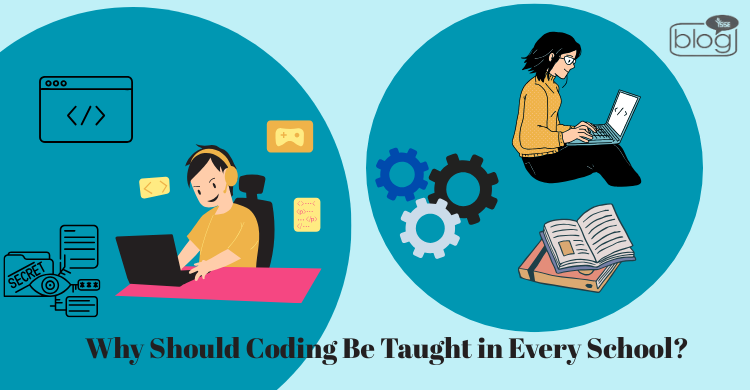In this digital world, coding is a must as a skill; it is now a new kind of understanding. Along with reading and writing books, coding has become popular in recent times. For this reason, every school should take the initiative to teach coding at a basic level at least. Code affects real-life problem-solving, analytical solving, as well as patience. The goal of providing coding in each classroom is to give students the skills they need to succeed in a world that is changing quickly, not just to prepare them for tech jobs.
Coding Encourages Critical Thinking and Problem-Solving
The ability to improve problem-solving abilities is one of the biggest advantages of learning to code. Students who learn to code must be able to deconstruct complicated issues into manageable chunks, resolve mistakes, and generate original solutions. This mentality is not limited to the computer lab; it also permeates other subjects, such as science and maths, and even aids students in taking a more thorough approach to problems in real life. Coding also teaches students to be persistent; if a program fails to work as planned, they must continue trying until they get it right.
It Encourages Creative and Innovative Thinking
Contrary to the widespread belief that coding is solely about rules as well as logic, it is actually a very creative process. Developing a website, implementation, or app requires creative thinking and imagination. Understanding code gives students a new way to express themselves. Coding enables them to realize their ideas and share these ideas with the world, much like painters or writers do. Students transition from being people to authors when given the tools to use technology, opening up a world of innovation and entrepreneurial activity.
Educates the pupils for the Future Employment Market
Jobs related to technology are in greater demand than ever before. Numerous industry reports state that programming and computer science abilities are some of the most in-demand in today’s labour market, and this trend is only expected to grow. However, knowing the fundamentals of coding can be very beneficial even in non-technical professions. Automating tasks, analyzing information, and on the internet tools—all of which depend on programming in one way or another—benefit industries such as advertising, finance, medical treatment, and engineering. We give youngsters an early jump on expertise that will benefit them in any career path by using coding in the classroom.
Encourages Empowerment and Knowledge of the Internet
Digital literacy is just as crucial in today’s technologically driven world as the ability to read and write. Pupils who comprehend how programs work are better able to safeguard their privacy, make educated choices online, and comprehend the algorithms that influence what they see online. Students who learn to code are able to comprehend and manage the technological equipment around them instead of allowing it to control them. The development of responsible technological citizens who can additionally assuredly and safely traverse the digital terrain depends on such knowledge.
It’s Now More Affordably Available
Even for young kids, coding can be taught in entertaining, suitable ways for their ages and visually, with the help of programs like Scratch, which uses blocks, and MIT App Inventor. These resources make learning enjoyable and don’t require any prior knowledge. Students can advance to more elaborate languages like Python or JavaScript as they develop. There has never been a greater potential benefit and a lower entry barrier.
It is not the goal of imparting coding in every classroom to make every student a software developer. Everyone in school should have the opportunity to learn vital life skills like imaginative thinking, problem-solving, proficiency with computers, and future readiness. Schools ought to show students the way to code in the same way that they teach them to write, read, and calculate. By doing this, we are empowering students to influence the future rather than merely preparing them to experience it.
To read more blogs like this, click here.
Writer,
Fabiha Tasnim
Intern, Content Writing Department
YSSE

